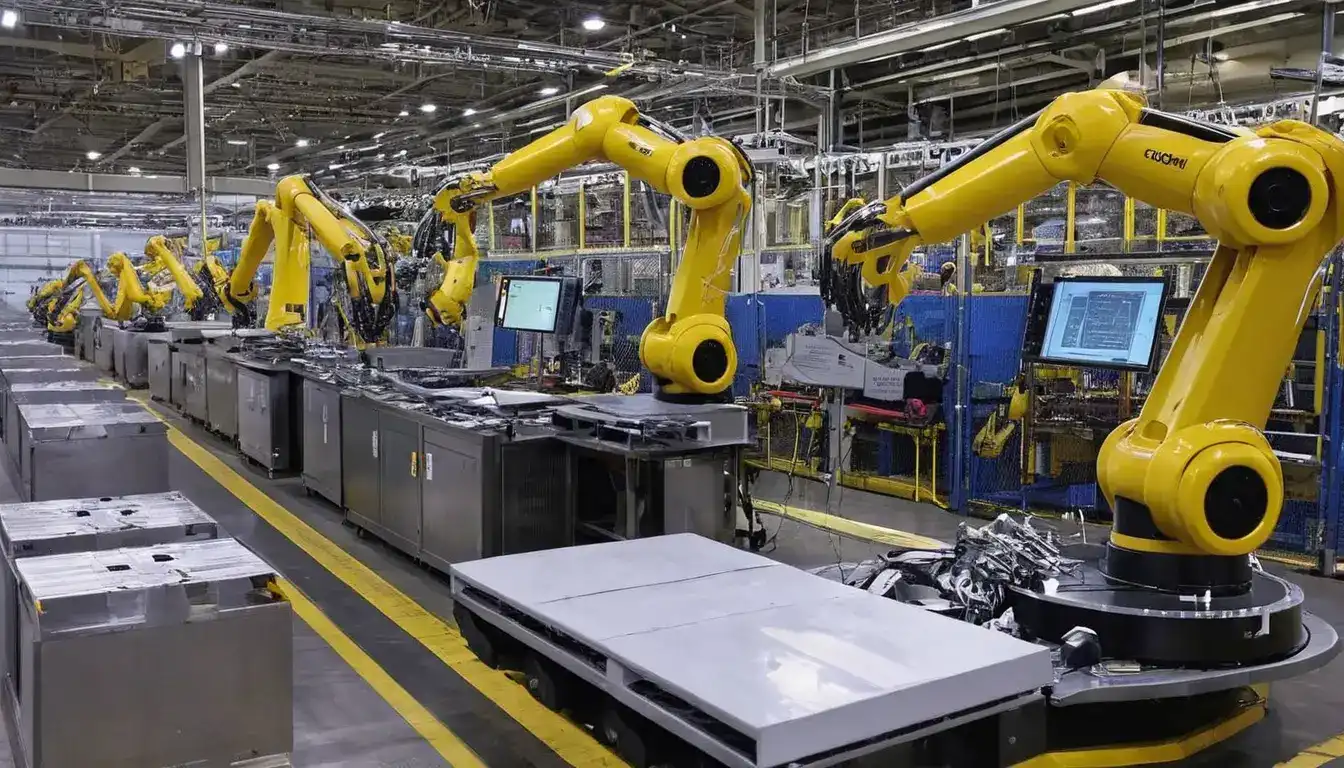Cross-Border Investment: Trends and Impact
Emily Willis

Photo: Cross-Border Investment: Trends and Impact
Navigating the Global Landscape: Understanding Cross-Border Investment Trends and Their Far-Reaching Impact
In an increasingly interconnected world, the flow of capital across national borders has become a cornerstone of global economic activity. Cross-border investment, a powerful engine for growth and development, allows businesses and individuals to tap into new markets, access diverse resources, and diversify their portfolios. However, this dynamic landscape also presents a unique set of challenges and complexities that demand careful consideration.
This article delves into the fascinating world of cross-border investment, exploring its fundamental concepts, current trends, and the profound impact it has on economies worldwide. We will also equip you with actionable insights and strategies to navigate this intricate global investment environment effectively.
What is Cross-Border Investment? A Foundation
At its core, cross-border investment refers to the movement of capital from one country to another for the purpose of acquiring assets, establishing business operations, or engaging in financial transactions. It's a broad term encompassing various forms of international capital flows, each with distinct characteristics and implications.
Defining the Landscape: FDI vs. Portfolio Investment
Understanding the nuances between different types of cross-border investment is crucial for grasping their varied impacts. The two primary categories are:
- Foreign Direct Investment (FDI): This type of global investment involves an ownership stake in a foreign company or project, typically with the intent of establishing lasting management control or significant influence over the foreign entity. FDI often involves building new facilities (known as greenfield investments) or acquiring existing businesses (cross-border mergers and acquisitions, or M&A). FDI is considered a stable and long-term form of international economic integration.
- Examples: A car manufacturer building a new factory in another country, or a technology company acquiring a local startup to expand its market presence.
- Foreign Portfolio Investment (FPI): Unlike FDI, FPI involves investing in financial assets such as stocks, bonds, and other securities of foreign companies, without gaining direct control or a significant management role. This is generally a more short-term and passive form of investment.
- Examples: An individual purchasing shares of a foreign corporation listed on an overseas stock exchange, or an investment fund buying government bonds from another country.
While both contribute to international investment flows, FDI is particularly vital for economic development as it often brings not just capital, but also technology, management expertise, and job creation.
Key Trends Shaping Cross-Border Investment Today
The landscape of cross-border investment is constantly evolving, influenced by technological advancements, geopolitical shifts, and changing global priorities. Staying abreast of these trends is essential for investors and policymakers alike.
The Rise of Digital Transformation and Technology
Digital transformation is profoundly reshaping global investment. The proliferation of digital technologies, from advanced analytics to artificial intelligence, is enhancing investment efficiency and expanding opportunities.
- Facilitating Global Reach: Digital platforms and e-commerce enable businesses to expand into new markets with greater ease, reducing traditional barriers to international trade. This creates new avenues for global investment, even for smaller enterprises.
- Enhanced Transparency and Data: Digitalization improves the transparency of accounting information and facilitates the collection and processing of market data, helping investors make more informed decisions and building trust.
- New Investment Opportunities: The digital economy itself has become a significant area for cross-border investment, with increasing capital flows into fintech, e-commerce, and other technology-driven sectors.
Shifting Geopolitical Dynamics and Trade Relations
Geopolitical tensions and changes in trade policies significantly impact cross-border investment flows. Events like trade wars and regional conflicts can lead to shifts in investment patterns and increased risk.
- Regionalization and Nearshoring: There's a growing trend towards regionalization and nearshoring, where companies relocate production closer to their home markets or within allied regions to enhance supply chain resilience and reduce geopolitical risks. This can influence where new FDI projects are established.
- Impact on FDI Flows: Global FDI flows have shown some weakness amidst economic slowdowns and rising geopolitical tensions. For instance, global FDI saw only a slight increase in 2024, masking underlying weaker trends in certain regions and a decline in cross-border M&A activity. Geopolitical events, such as Brexit, have demonstrably impacted specific regions' attractiveness for inbound investment.
The Growing Importance of ESG and Sustainable Investment
Environmental, Social, and Governance (ESG) factors are increasingly central to cross-border investment decisions. Investors are looking beyond traditional financial returns to consider a company's sustainability and ethical conduct.
- Risk Management and Reputation: Companies with strong ESG performance are often perceived as less risky, as they can better identify and mitigate environmental and social risks, thereby reducing investment uncertainty. Strong ESG credentials also enhance a company's international reputation and brand value.
- Attracting Capital: Good ESG performance can significantly enhance a company's attractiveness for cross-border investment, potentially leading to higher market valuations and easier access to capital. This trend is driven by consumer demand, regulatory pressures, and a global shift towards sustainable development.
- Regulatory Landscape: The rise of cross-border ESG regulations means companies must navigate a complex web of disclosure rules, with non-compliance potentially leading to reputational damage and legal challenges.
Emerging Markets: A Continued Magnet for Capital
Despite global fluctuations, many emerging markets continue to attract significant cross-border investment due to their growth potential, expanding consumer bases, and evolving infrastructure. While greenfield project announcements in developing countries saw an increase in value in 2023, there was a decline in the first half of 2024 in terms of both number and value for greenfield FDI projects.
- Growth Opportunities: These markets often offer higher potential returns, although they may also come with increased risks such as political instability, currency volatility, and regulatory complexities.
- Human Capital Development: FDI in emerging economies often leads to the development of human capital through training and skill transfer, boosting the local workforce's competence and overall education levels.
The Far-Reaching Impact of Cross-Border Investment
The effects of cross-border investment reverberate throughout economies, influencing various sectors and aspects of society.
Economic Growth and Job Creation
One of the most direct and celebrated impacts of foreign direct investment is its contribution to economic growth and the creation of new jobs. When foreign investors establish new companies or expand existing operations, they directly stimulate employment and economic activity in the host country.
- Increased Income and Purchasing Power: New jobs and higher wages, often offered by large multinational corporations, can lead to an increase in national income and greater purchasing power for locals, boosting the overall economy.
- Manufacturing and Services Boost: FDI particularly boosts the manufacturing and services sectors, which are crucial for reducing unemployment rates.
Technology Transfer and Innovation
Cross-border investment serves as a vital conduit for the transfer of advanced technologies, management practices, and expertise. This influx of knowledge can significantly enhance a host country's industrial capabilities and foster innovation.
- Improved Productivity: Access to new varieties of capital inputs and operational practices from around the world can lead to improved productivity and efficiency for local firms.
- Competitive Market: The entry of foreign organizations often introduces healthy competition into domestic markets, pushing local companies to continuously enhance their products and processes, thereby fostering innovation and benefiting consumers.
Market Access and Competition
International investment facilitates access to new markets for both the investing and host countries. It allows businesses to expand their customer base and diversify their revenue streams.
- Breaking Monopolies: FDI can help break domestic monopolies, creating a more competitive environment that drives innovation and offers consumers a wider range of competitively priced products.
- Export Promotion: Many goods produced by FDI are destined for global markets, not solely domestic consumption, thereby assisting host countries in boosting their exports.
Geopolitical Influence and Soft Power
Beyond economic benefits, cross-border investment can also play a role in international relations, serving as a tool for soft power and influencing geopolitical dynamics. Stable and long-lasting links between economies fostered by FDI can contribute to broader international economic integration.
Potential Challenges and Risks
While the benefits are substantial, cross-border investment is not without its challenges and risks. These can include:
- Currency Risk: Fluctuations in exchange rates can significantly impact the profitability and value of international investments. Effective hedging strategies are often necessary to mitigate this.
- Political and Economic Instability: Changes in trade policies, government regulations, or political turmoil in a foreign country can pose significant risks to investment returns.
- Regulatory Hurdles and Legal Frameworks: Navigating diverse and complex legal and regulatory systems, including varying tax laws and intellectual property rights, can be time-consuming and costly. Inconsistent treatment between local and foreign funds can also create unforeseen costs.
- Information Asymmetry and Due Diligence: Accessing reliable information and conducting thorough due diligence on foreign investments can be challenging, particularly in less transparent markets.
- Cultural Differences: Understanding and respecting cultural nuances is crucial, as cultural barriers can affect communication, management styles, and overall business practices, potentially impacting the success of the investment.
Strategies for Navigating the Cross-Border Investment Landscape
To harness the opportunities and mitigate the risks associated with cross-border investment, a strategic approach is essential.
Due Diligence is Paramount
Thorough research and due diligence are the cornerstones of successful global investment.
Latest ✨
View AllDitch stressful tests! Gamified assessment makes evaluations fun, fair & future-ready. Unlock true potential with engaging, insightful methods.
Emily Willis
secrets to mastering your business financial plan with five simple steps. Learn how to analyze financial data, set measurable goals, and create a comprehensive strategy for success. Unlock profitability, make confident decisions, and ensure a bright future for your business
Emily Willis
Europe is full of rich culture, with ten cities offering enriching cultural experiences. From the romance of Paris to the splendor of Rome and the artistic flair of Barcelona, each city has its own unique charm and heritage.
Emily Willis
invitation to go on a wildlife safari through Kenya, Tanzania, and Australia. It describes the unique wildlife encounters in each country, such as witnessing the Great Migration in Kenya, exploring the Serengeti in Tanzania, and encountering koalas and kangaroos in Australia.
Emily Willis
Business
View All
June 9, 2025
Innovation Strategy for Future BusinessInnovation is vital for future business success. Learn why a robust strategy ensures survival, growth, and competitiveness in a changing world.
Emily Willis

June 8, 2025
Importance of Corporate GovernanceCorporate governance isn't just for boardrooms. Understand its vital role in ethical business, trust, and sustainable growth for all stakeholders.
Emily Willis

June 9, 2025
Succeed with SaaS Business ModelMaster the SaaS business model! This guide reveals strategies for building a thriving enterprise, from understanding the landscape to achieving product-market f...
Emily Willis
Economy
View AllUnpack the immense power of central banks and how they're held accountable for shaping the economy and your financial life.
Read MoreTechnology is now an integral part of our daily lives and economies, driving innovation, boosting productivity, and fueling economic growth. It streamlines research and development, facilitates collaboration, automates mundane tasks, and democratizes innovation.
Read MoreThe inflation threat explained. Understand its causes and discover effective cures to protect your purchasing power and navigate economic challenges.
Read MoreEntertainment
View All
August 5, 2024
Classic Films: Timeless Masterpieces in the Age of StreamingClassic films may seem outdated in today's world of instant gratification and endless streaming options, but they offer enduring stories, masterful storytelling, historical insights, technical innovation, and artistic value that surpass modern offerings. While classic films face challenges such as accessibility and pacing, there are ways to overcome these obstacles, such as using streaming services, visiting local libraries, attending film festivals, and utilizing online resources.
Emily Willis

August 4, 2024
The Latest Music Trends, Artists Influencing Pop Culture, and How Digital Platforms Facilitate the Distribution of Music GloballyThe music industry is constantly changing due to consumer preferences, technology, and the influence of artists. Digital platforms have revolutionized music creation, distribution, and consumption, leading to genre fusion, the rise of independent artists, and collaborative projects. Influential artists like Billie Eilish, BTS, and Taylor Swift have shaped pop culture globally. Streaming services, social media, and direct-to-fan engagement have transformed music distribution. Digital platforms also promote cultural diversity and inclusivity, expand markets and revenue, and drive technological advancements. The industry is also focusing on sustainability and ethical practices. To succeed in the future, stakeholders must embrace digital transformation and champion inclusivity.
Emily Willis

August 5, 2024
Entertainment in Society: Social Impact, Cultural Influence, Economic ContributionsEntertainment is more than just a way to pass the time it has a significant impact on society, culture, and the economy. It promotes empathy, sparks conversations, and drives social change. It reflects and shapes cultural trends, while also preserving traditions. The entertainment industry generates jobs, contributes to economic growth, and drives technological innovation.
Emily Willis
Health
View AllRegular exercise is essential for maintaining both physical and mental health. It helps with weight management, cardiovascular health, muscle strength, energy levels, and sleep quality. Exercise also reduces stress and anxiety, improves mood, cognitive function, and self-esteem, and lowers the risk of depression. Different types of exercises, such as aerobic, strength training, flexibility, balance, and mind-body exercises, contribute to overall health. To start and maintain an exercise routine, it is important to start slowly, set realistic goals, find enjoyable activities, stay consistent, and listen to your body.
Emily Willis
Maintaining good health involves a balanced diet that provides essential nutrients for the body. A balanced diet includes carbohydrates, proteins, fats, vitamins, minerals, fiber, and water. Benefits of a balanced diet include enhanced energy levels, improved mental health, a stronger immune system, better weight management, reduced risk of chronic diseases, and enhanced digestion. Components of a balanced diet include fruits and vegetables, whole grains, protein sources, dairy or dairy alternatives, and healthy fats. Tips for maintaining a balanced diet include planning meals, portion control, staying hydrated, limiting processed foods, eating mindfully, and including physical activity.
Emily Willis
sleep for physical and mental well-being, discussing the benefits of sleep such as physical restoration, brain function, emotional regulation, concentration, and reduced risk of chronic diseases. It explains the different stages of the sleep cycle and provides guidelines for how much sleep individuals of different ages need.
Emily Willis
Trending 🔥
View All
1
2
3
4
5
6
7
8
9
10
Sports
View AllAugust 5, 2024
Celebrating Sports Legends: Honoring Iconic Figures and Their Enduring Impact
Read MoreAugust 4, 2024
The Importance of Mental Training and Psychological Strategies in Helping Athletes Reach Their Peak Performance on the Field
Read MoreTechnology
View All
August 4, 2024
AI-Powered Robots Take Over Manufacturing Jobs: Is Our Workforce Prepared?
AI-powered robots are transforming the manufacturing industry, leading to increased efficiency and improved product quality. While concerns about job displacement exist, AI is more likely to transform jobs rather than eliminate them.

August 5, 2024
Challenges and Opportunities in Implementing IoT Technology
The Internet of Things (IoT) is revolutionizing industries by enabling real-time monitoring, automation, and decision-making. However, implementing IoT technology comes with challenges such as security concerns, interoperability issues, data management, scalability, and cost. Despite these challenges, IoT offers opportunities for operational efficiency, enhanced customer experience, innovation, environmental sustainability, and business intelligence.

August 5, 2024
Tips for Keeping Your Personal Data Safe on the Internet
The digital age has made personal data more vulnerable to threats such as phishing, hacking, identity theft, and data breaches. To protect yourself, it is important to create strong passwords, be cautious of phishing attacks, secure your devices, safeguard your personal information online, practice safe online shopping and banking, protect your social media accounts, and stay informed about cybersecurity threats.

August 5, 2024
The Future of Cybersecurity and Upcoming Challenges
cybersecurity in the digital age, highlighting key trends and challenges that will shape the future of cybersecurity. It addresses issues such as the increased use of AI and ML, the growth of IoT devices, ransomware attacks, cloud security, and supply chain attacks. It also outlines upcoming challenges in cybersecurity, including talent shortage, regulatory compliance, cybersecurity for remote work, quantum computing, and social engineering attacks.





















